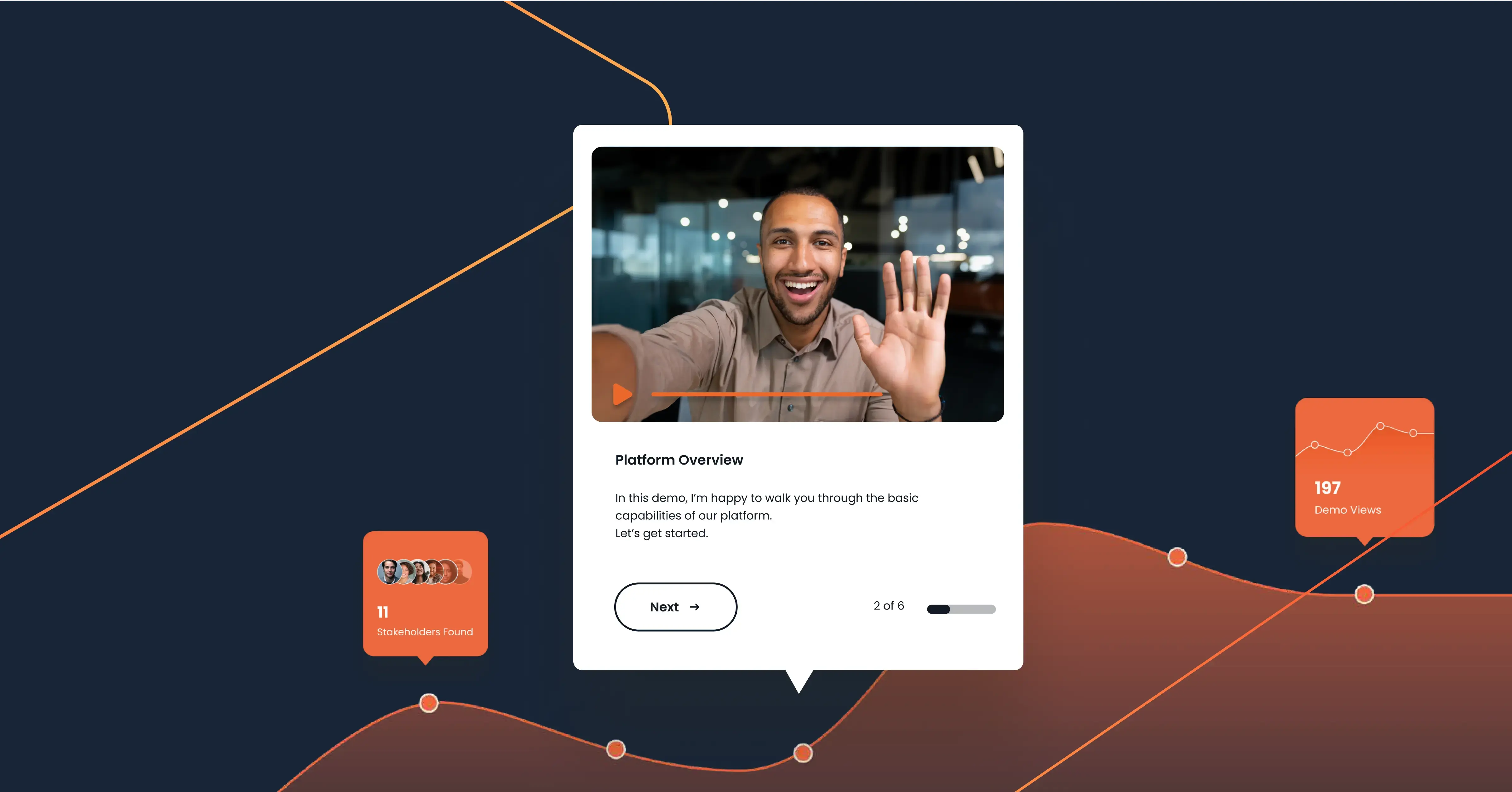Todd Janzen is a lifelong advocate for the Sales Engineering profession and a true engineer at ...
Close more deals with
Demo Automation.
Watch a Demo
With today’s buyers spending just 16% of their buying time meeting with potential suppliers, buyers want more than just a sales pitch—they need someone who truly understands their technical challenges and can demonstrate exactly how your solution solves their specific problems.
This is where presales professionals shine. They bridge the critical gap between what your product can do and what your customers need it to do. They’re the trusted advisors who help buyers navigate complexity, build internal consensus, and gain confidence in their decision-making.
But they can’t do it alone. Without the right tools, training, and strategic support, even the most skilled presales teams can struggle to deliver consistent value at scale.
This guide breaks down everything you need to know about presales enablement—from key components and essential tools to measuring success and building an effective strategy. Whether you’re a sales leader looking to boost win rates or a presale professional seeking to maximize your impact, you’ll discover actionable insights to transform your technical sales approach.
What Is Presales Enablement?
Presales enablement is the strategic approach to equipping technical sales professionals with the tools, resources, and knowledge they need to effectively support the sales process and drive revenue. It focuses specifically on empowering presales teams to demonstrate product value, address technical questions, and build customer confidence throughout the buying journey.
Organizations with formal presales enablement programs are 96% more likely to achieve a competitive level of success compared with companies without them. Unlike traditional training programs that provide one-time knowledge transfer, presales enablement creates continuous learning pathways tailored to the unique challenges of technical sales roles. It helps presales professionals communicate complex technical concepts in business terms that resonate with buyers.
The best presales enablement programs combine product knowledge, technical skills development, and consultative selling techniques to create high-performing technical sales teams.
Presales Enablement vs Sales Enablement
Presales enablement and sales enablement serve different purposes within revops, but they share some common goals.
Presales enablement focuses specifically on technical sales professionals who need deep product knowledge and demo skills to support complex sales.
Sales enablement has a broader focus on the entire sales organization, with greater emphasis on messaging, objection handling, and closing techniques.
Interestingly, less than 2% of presales leaders say they support the sales function exclusively, reflecting the broader scope presales teams now cover.

Content requirements also differ significantly between these disciplines. Presales enablement requires technical documentation, demo environments, and product training materials, while sales enablement typically emphasizes sales methodologies, competitive information, and customer-facing collateral.
Success metrics for presales enablement often include technical win rate, demo-to-close ratio, and solution fit accuracy, whereas sales enablement typically measures pipeline generation, quota attainment, and sales productivity.
Key Components of Presales Enablement
At its core, effective presales enablement isn’t just a set of trainings or a stack of tools—it’s a strategic framework designed to empower presales teams at every stage of the sales cycle. It brings together critical components that span both technical expertise and consultative soft skills, giving presales the confidence and capabilities to turn complex solutions into compelling, customer-ready value stories.
And here’s what high-growth companies already know: The most valuable assets aren’t always visible on a balance sheet. These companies are investing 2.6x more in intangible assets like knowledge development and presales excellence—because they understand that well-equipped presales teams don’t just support deals; they accelerate them, grow them, and make them stick.
Understanding the Buyer’s Needs
Presales professionals must excel at uncovering and addressing customer requirements through effective discovery techniques, like:
- Active listening skills allow presales teams to interpret both explicit and implicit customer needs, reading between the lines to identify underlying problems that prospects may not fully articulate.
- Data-driven discovery leverages analytics to identify pain points before demos, enabling more targeted and relevant presentations that address specific customer challenges.
- Persona development helps presales teams tailor their approach based on the roles, responsibilities, and priorities of different stakeholders in the buying process.
- Structured question frameworks provide a systematic approach to needs discovery, ensuring presales professionals gather comprehensive information while demonstrating expertise and building credibility with prospects.
Once the right insights are uncovered, presales teams can use storytelling techniques to frame features within buyer-led sales narratives, connecting technical capabilities to business outcomes in a way that’s meaningful to buyers.
Providing Impactful Product Demonstrations
The ability to deliver compelling product demos to communicate value clearly across technical and business audiences is a cornerstone of presales success—making it a critical focus area for enablement programs.
Effective demo preparation goes far beyond learning the product. It involves researching the prospect’s industry, business challenges, and technical environment to craft personalized demonstrations that speak directly to their priorities.
The best sales engineers don’t just show features—they tell stories. Rather than saying, “Here’s what our product can do,” they frame it as a story, such as saying, “Let me show you how other companies in your industry are solving this exact problem.” This simple framing transforms technical walkthroughs into compelling narratives that prospects could see themselves in.
Consensus takes this even further. With a complete Product Experience Platform, presales teams can scale this storytelling approach—delivering personalized, on-demand demos that engage stakeholders before the first meeting even happens.
It’s all about tapping into the three senses that drive digital buying decisions: sight, sound, and feel. In a remote-first, self-serve buying journey, activating these senses isn’t always easy—but Consensus makes it effortless. From interactive product demos, engaging product tours, and no-code-needed automated product simulations, every experience is designed to make your solution more tangible, memorable, and impactful.

Taking Part in Regular Training and Learning
According to our 2025 Sales Engineering Compensation and Benchmark Report, presales teams spend a significant portion of their time improving product knowledge—and for good reason. The tech landscape evolves rapidly, and staying ahead of these changes is critical for maintaining credibility with technically savvy buyers.
Ongoing learning is crucial for maintaining their effectiveness in a rapidly evolving technology landscape. Product knowledge training ensures teams stay current with new features and capabilities, enabling them to confidently demonstrate the latest innovations to prospects. In fact, it takes two to three times longer to fully onboard sales engineers compared to account executives, making continuous enablement even more vital.
Critical areas for continuous learning include:
- Product Knowledge: Continuous education on new features and capabilities
- Industry Trends: Staying current on market developments and customer priorities
- Competitive Intelligence: Understanding competitor offerings and differentiation points
- Certification Programs: Formal validation of technical and sales skills
- Soft Skills Development: Training in communication, executive presence, and strategic storytelling to better connect with diverse stakeholder personas
- Demo Strategy and Tool Proficiency: Learning how to leverage demo automation, interactive tours, and buyer engagement data to scale presales impact
Aligning With the Revenue Team
Presales enablement should encourage collaboration between presales and other revenue teams to ensure consistent messaging and seamless buyer experiences. This kind of cross-functional alignment isn’t just nice to have—it’s a growth accelerator. When presales operate in sync with sales, marketing, and customer success, every team becomes more effective, and the buyer journey becomes far more cohesive.
Here’s how strategic alignment plays out across the revenue org:
- Sales-presales alignment creates shared goals and communication channels, ensuring account executives and presales professionals work effectively together throughout the sales process.
- Marketing collaboration ensures consistent messaging and content sharing, with presales providing technical input for marketing materials and marketing supporting presales with customer-facing content.
- Customer success integration prepares for smooth handoffs post-sale, with presales teams sharing critical information about customer requirements and expectations.
Presales Enablement Tools
Technology solutions play a crucial role in supporting presales enablement efforts, helping teams work more efficiently and effectively. The right tool stack can dramatically improve presales performance and scalability, enabling teams to deliver consistent, high-quality experiences to prospects while managing increasing demand.
Modern presales organizations leverage a variety of specialized tools including:
Product Experience Platforms
Product experience platforms (PXP) help presales teams create, share, and track interactive product experiences that allow prospects to self-educate on products at their own pace. Presales professionals use these platforms to build, personalize, and optimize product experiences, giving buyers the resources they need to not only learn about your product but also learn why your product is right for them. These platforms also ensure consistent messaging across all product experiences, maintaining quality while increasing reach.
With Consensus’s product experience platform, you can sell your entire ecosystem, not just a product. The software empowers teams to accelerate deal cycles and boost revenue by helping them showcase their complete solution, engage all key stakeholders, and proactively address prospect needs with valuable content.
This leads to larger deals with more products per opportunity, reduced deal risk, and a stronger competitive edge. It’s no wonder Consensus users see 50% larger deal sizes, double their number of deals, and reduce their sales cycle by 30%.
Sales and Revenue Intelligence Software
Sales and revenue intelligence tools provide valuable insights into prospect behavior, helping presales teams prioritize their efforts based on engagement data and purchase likelihood. These platforms track interactions across channels, identifying patterns that indicate buying intent and readiness for technical discussions.
By integrating with CRM systems, they provide a complete view of the customer journey, enabling presales teams to enter conversations with full context about previous interactions.
Sales Enablement Platforms
Sales enablement platforms provide centralized access to sales collateral, training materials, and other resources that presales teams need to support the sales process effectively. These platforms organize content by sales stage, buyer persona, and use case, making it easy for presales professionals to find the most relevant materials for each customer interaction.
Many sales enablement platforms also include learning management capabilities, supporting the ongoing education that presales professionals need to stay current with product developments and market trends. Analytics features help identify which content is most effective at advancing deals, informing continuous improvement of presales materials and approaches.
Proposal and Quote Generation Software
Proposal and quote generation tools help presales teams quickly create accurate proposals and quotes based on customer requirements, streamlining the sales process and reducing errors. These platforms typically include templates that ensure consistent formatting and messaging, while allowing customization to address specific customer needs.
Integration with CRM and CPQ (Configure, Price, Quote) systems ensures pricing accuracy and maintains a complete record of all customer communications.
Advanced proposal tools also provide analytics on customer engagement with proposals, helping presales teams understand which sections receive the most attention and which may require follow-up explanation. This intelligence helps focus conversations on the areas of greatest interest or concern to prospects.
Presales Management
Specialized tools for managing presales operations help teams optimize resource allocation, demo scheduling, and performance tracking. These platforms provide visibility into presales workload and capacity, enabling managers to distribute assignments effectively and identify potential bottlenecks before they impact deal velocity.
Presales management tools also facilitate collaboration between presales team members, enabling knowledge sharing and consistent approaches to common customer scenarios. This collaborative environment helps new team members ramp up quickly while ensuring experienced professionals benefit from collective wisdom.
RFP Platforms
RFP (Request for Proposal) platforms help presales teams efficiently respond to formal requests, leveraging knowledge bases and collaboration features to streamline what can otherwise be a time-consuming process. These tools maintain libraries of pre-approved responses to common questions, allowing teams to quickly assemble accurate, comprehensive proposals without reinventing the wheel for each new opportunity.
Advanced RFP platforms also provide analytics on win rates associated with different response approaches, helping teams refine their strategies over time. Integration with CRM systems maintains a complete record of all RFP activities and outcomes, informing future pursuit decisions.
Data and Analytics Tools
Data and analytics tools help presales teams measure their impact, identify trends, and make data-driven decisions to improve performance. These platforms track key metrics like demo effectiveness, technical win rate, and solution fit accuracy, providing insights into what’s working and what needs improvement. They can also identify patterns in successful deals, helping presales teams replicate winning approaches across their portfolio.
With Consensus’s industry-leading analytics, Demolytics, you get actionable insights into how to improve your product experiences. For example, heat maps show which product features attract the most attention, while engagement data highlights which prospects are closer to making decisions. Sales and presales teams can use these insights to focus on high-value leads, reduce time spent on low-priority activities, and accelerate deal progression.

Presales Enablement Collateral
Effective presales enablement requires a variety of content and resources that support teams throughout the sales cycle. These materials help presales professionals communicate complex technical concepts, demonstrate product capabilities, and address customer concerns consistently and effectively.
Well-designed collateral saves time, ensures message consistency, and improves the quality of customer interactions.
Essential presales enablement resources include:
- Product Knowledge Bases: Centralized repositories of product information, technical specifications, and implementation details
- Automated Demos: Pre-built demonstration sequences that showcase key product capabilities and can be personalized for specific customer needs
- Technical Whitepapers: In-depth explorations of product capabilities, architecture, and technical differentiators
- Demo Scripts and Templates: Standardized starting points for customized demonstrations that ensure coverage of key messages
- Competitor Battlecards: Quick reference guides for competitive situations, highlighting differentiation points and addressing competitor claims
- Case Studies: Real-world examples of successful implementations that illustrate product value in specific contexts
- ROI Calculators: Tools for quantifying the value proposition in financial terms meaningful to business decision-makers
- Implementation Guides: Resources for explaining deployment processes, timelines, and resource requirements
KPIs to Measure for Presales Enablement
Measuring the effectiveness of presales enablement efforts through specific presales key performance indicators (KPIs) helps organizations refine their programs and demonstrate ROI. Tracking these metrics provides visibility into what’s working and what needs improvement, enabling data-driven decisions about enablement investments.
A balanced scorecard of metrics ensures comprehensive evaluation of presales enablement impact across multiple dimensions of business performance.
Demo Qualified Leads
Demo Qualified Leads (DQLs) are prospects who have engaged with product demonstrations and shown sufficient interest to warrant further sales engagement. This metric helps quantify the contribution of presales activities to pipeline development, connecting technical demonstrations directly to sales outcomes.
DQLs typically show higher conversion rates than other lead types because they’ve already experienced the product’s capabilities and seen how it addresses their specific needs. Only about 13% of Marketing Qualified Leads (MQLs) turn into Sales Qualified Leads (SQLs), and only about 6% of SQLs close. That means that, if you have 1,000 MQLs, on average, only about 8 will convert.
To calculate this metric, track the number of prospects who engage meaningfully with demonstrations (whether live or automated) and subsequently move forward in the sales process. Companies that utilize demo qualification have seen lead-to-close rates increase, such as AdvancedMD, which reached a 44% lead-to-close rate with the help of Consensus’s product demo tools.
Views Per Deal
Views per deal measures the number of demonstration views associated with each closed deal, providing insights into the breadth of stakeholder engagement throughout the buying process. Higher numbers typically indicate broader involvement across the buying committee, which often correlates with larger deal sizes and higher implementation success rates.
Competitive Win Rate
Competitive win rate measures the percentage of deals won against specific competitors, highlighting the effectiveness of presales enablement in equipping teams for competitive situations. This metric helps identify which competitors pose the greatest challenges and which presales approaches are most effective in differentiated positioning.
Calculate this metric by dividing the number of competitive deals won by the total number of competitive deals decided (won or lost) within a specific period.
Gross Revenue Retention
Gross revenue retention measures the percentage of recurring revenue retained from existing customers, excluding new business from expansions. This metric reflects the effectiveness of presales enablement in ensuring proper solution fit and setting accurate expectations during the sales process.
You can measure gross revenue retention by dividing the recurring revenue retained at the end of a period (excluding expansions) by the recurring revenue at the beginning of that period.
Net Revenue Retention
Net revenue retention includes gross revenue retention plus expansion revenue, providing a comprehensive view of customer relationship health and growth. This metric reflects the combined effectiveness of presales enablement in both initial solution fit and ongoing value delivery.
Net revenue retention is determined by dividing the total recurring revenue at the end of a period (including expansions) by the recurring revenue at the beginning of that period.
Pipeline Through Self-Service Demo Automation
This metric measures the pipeline value generated through automated demos that allow prospects to self-educate without requiring presales resources. It quantifies the scalability benefits of presales enablement, showing how automated approaches extend beyond what’s possible with traditional high-touch models.
By tracking pipeline attribution to self-service demonstrations, organizations can measure the ROI of automation investments and optimize their mix of high-touch and self-service engagement models.
Start Building Your Presales Enablement Strategy
Modern presales organizations are increasingly leveraging product experience platforms like Consensus to scale their presales enablement efforts. Consensus empowers your presales team to create engaging, interactive product experiences that buyers can access on demand, dramatically increasing your reach while reducing the burden on technical resources.
And with Consensus’s Demolytics, you gain real-time visibility into how your demos are performing across stakeholder groups. You can measure essential presales metrics like viewing time, stakeholder engagement, sharing behavior, drop-off points, and individual interest areas—giving you the insights to know who’s leaning in, what resonates, and where to follow up.
This isn’t just presales support. It’s buyer enablement at scale. With Consensus, you’re no longer guessing when to reach out or how to tailor your next conversation. You’re equipped with data-driven signals that help your team engage the right people, at the right time, with the right message—accelerating deals and increasing conversion.
See how Consensus can work for you.
Presales Enablement FAQs





